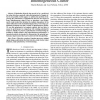Free Online Productivity Tools
i2Speak
i2Symbol
i2OCR
iTex2Img
iWeb2Print
iWeb2Shot
i2Type
iPdf2Split
iPdf2Merge
i2Bopomofo
i2Arabic
i2Style
i2Image
i2PDF
iLatex2Rtf
Sci2ools
TSP
2008
2008
Polarimetric Detection of Targets in Heavy Inhomogeneous Clutter
Polarization diversity has proved to be a useful tool for radar detection, especially when discrimination by Doppler effect is not possible. In this paper, we address the problem of improving the performance of polarimetric detectors for targets in heavy inhomogeneous clutter. First, we introduce a new polarimetric radar model that includes the realistic dependence of the clutter reflections on the transmitted signal. Then, we develop a polarimetric detection test that is robust to inhomogeneous clutter. We run this polarimetric test against synthetic and real data to assess its performance in comparison with existing polarimetric detectors. Finally, we propose a polarimetric waveform-design algorithm to further improve the target-detection performance. A numerical analysis is presented to demonstrate the potential performance improvement that can be achieved with this algorithm.
| Added | 16 Dec 2010 |
| Updated | 16 Dec 2010 |
| Type | Journal |
| Year | 2008 |
| Where | TSP |
| Authors | Martin Hurtado, Arye Nehorai |
Comments (0)

